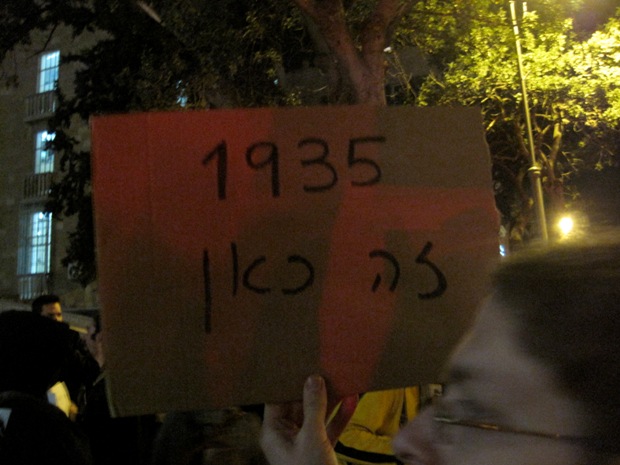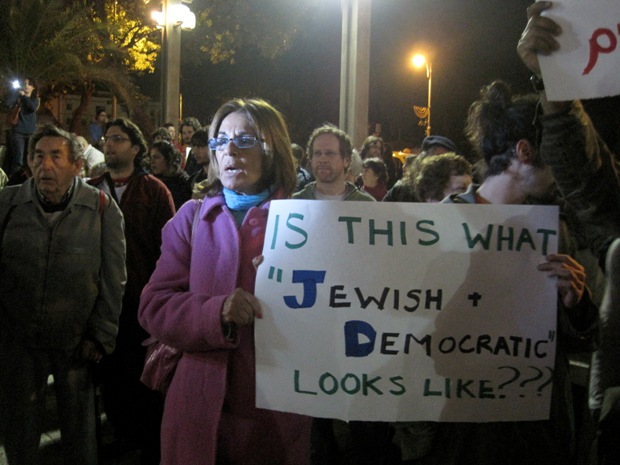The rabbis’ ruling against renting homes to Arabs, made public this week, brought dark memories to some Israelis
At Wednesday night’s protest in front of the Great Synagogue in Jerusalem condemning the rabbis’ letter, the message was clear: 1935 is here, referring to the legislation of the Nuremburg Laws in Nazi Germany.
Speakers at the rally, which included former Knesset speaker Avrum Burg and Holocaust studies professor Amos Goldberg, spoke of the abomination inherent in Jews calling on other Jews to actively discriminate against non-Jews after everything Jews have undergone; of the overwhelming fear and anger felt due to the fact that the government will not take action against the racist and fascist elements in this country. The parallel that can be made is indeed terrifying.
The same lucid fanaticism that allowed antisemitism to flourish in Europe of the 1930’s is rampant here in Israel towards the Palestinians. In the years before the instatement of the Nuremburg Laws, Jews found it increasingly difficult to rent homes in Germany. They were consistently turned away by landlords, and pressured into selling their homes.
Victor Klemperer, a German Jew-turned Protestant who survived the Holocaust in Dresden and is known for the diaries he wrote under Nazism, was all too aware of the downward spiral Germany was on already in 1933. Some quotes from his diaries are frighteningly representative of the realities in Israel today.
“At any moment a new ‘law’ can kick away the steps on which I’m standing and then I’m hanging.”
i.e. the loyalty oath amendment to the Citizenship Law, the Nakba law, the “Jewish National Fund” law (which seeks to rescind the 1995 Supreme Court ruling that state authorities cannot discriminate against non-Jews when leasing land).
“It is shocking how day after day naked acts of violence, breaches of the law, barbaric opinions appear quite undisguised as official decree.”
i.e. the rabbis’ letter, settler violence and damage of property, police harassment, army oppression, Avigdor Lieberman, etc.
“Everything I considered un-German, brutality, injustice, hypocrisy, mass suggestion to the point of intoxication, all of it flourishes here.”
i.e., Israel was established on the premise that it would be a light unto the nations, that it would provide equal rights for all its inhabitants irrespective of religion, race of sex. Something very different flourishes here.
Nazi policies and Israeli policies are certainly not the same and the contexts of each conflict deserve different treatment. However, the traumatic legacy of European antisemism seems to live on in Israel of 2010, where defensive, hyper-nationalism reigns. It is truly scary to see one’s religion, one’s society, one’s country, fall into darkness.
Victor Klemperer, who saw himself as first and foremost “a German, a European, a twentieth-century man,” was able to see what his country was becoming already in 1933. What will it take for the people of this country to realize that 1935 is here?
*All quotes are taken from: Victor Klemperer. I Will Bear Witness: A Diary of the Nazi Years 1933-1941. Translated by Martin Chalmers. New York: The Modern Library, 1992.



